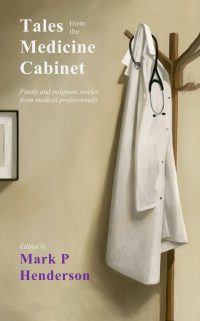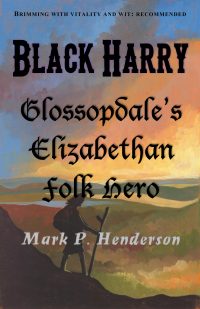Mark P. Henderson insists on the middle initial in his name because there’s another novelist called Mark Henderson who writes in a very different genre. In distancing himself , Mark (Mark P., that is) perhaps highlights his status as a member of modern society’s most marginalised group: he’s male, white, middle class and heterosexual. He’s also old, as carbon-14 measurements on his tissue samples have demonstrated. Poor fellow. Since he has so little going for him, he hopes people will buy his books on the basis of compassion.
Once upon a time he was a moderately efficient hospital doctor, a physician specialising – if that’s not the wrong word – in what was then called “internal medicine”. That meant he could deal more or less competently with routine conditions, but when he encountered patients with interesting diseases presenting diagnostic challenges, he had to refer them to someone clever, someone in a real specialism appropriate for the case.
Then he gave up medical practice and turned to research, somehow scraping up a PhD award en route. Much of his research interest focussed on the underlying cause of deep venous thrombosis (DVT) and the implications for prevention of this potentially life-threatening condition. Psychiatric examination of his research interest revealed roots in his early childhood, when his infelicitous behaviour provoked his grandmother into calling him a “clot”. His discoveries about the causation of DVT ran counter to mainstream thought in medicine and have therefore been ignored. The fact that the preventative measures he proposed don’t require drugs, and therefore don’t suit the interests of Big Pharma, is of course irrelevant.
When he took early retirement and moved to the Peak District of Derbyshire at the beginning of the twenty-first century, he underwent a sea change, though without any of the ludicrous modern fad for altered pronouns. He revived his youthful love of the natural world, spending days tramping over bleak rocky moors and green valleys, identifying flowers and birds and absorbing the beauty of the landscape. Concomitantly, he began to collect local folktales and learned how to tell them effectively. This interest culminated in a published collection of traditional Peak District tales (a second collection is in preparation) and a series of films in which he can be seen telling some of the stories in situ (http://www.peakinthepast.co.uk; scroll down to “Folktales”). He also started to write fiction and has had a few pieces of work published.
He’s secretary of a local creative writing group, a member of two other such groups, one of the team running the Glossop Bookfest, and a creative writing teacher. Most of his income, apart from his stingy pensions, comes from editing – mainly medical and scientific papers written by non-English-speaking authors, though he’s also edited novels and memoirs. He makes time to read, on the grounds that all writers need to read. Occasionally he avails himself of opportunities to eat and sleep.


